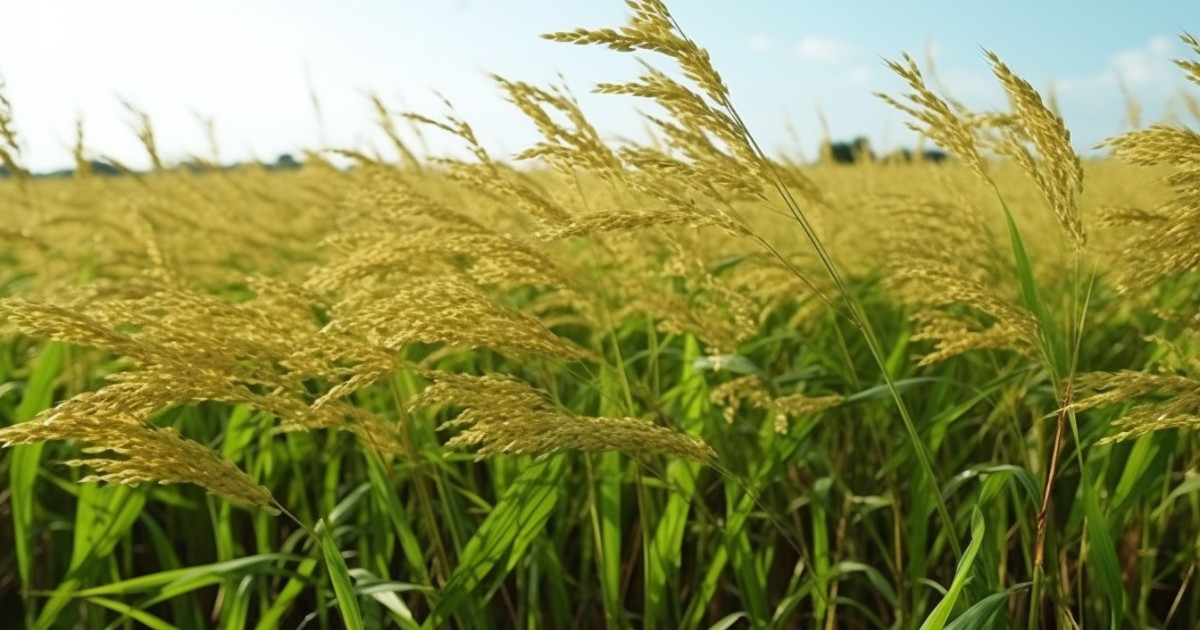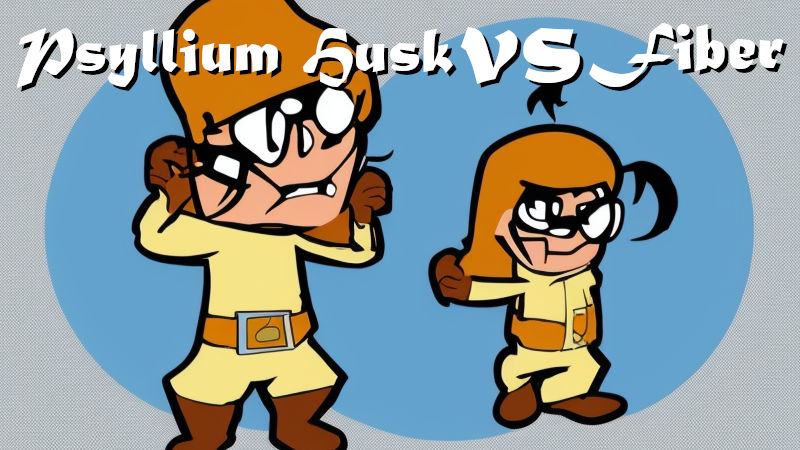The debate over psyllium husk vs fiber from other sources is ongoing, with some individuals preferring the former, and others favouring different types of fiber.
In this article, we will explore the main differences between psyllium husk and various other fiber sources, as well as the reasons behind people’s preferences. We will also provide some considerations for choosing the best fiber option for yourself.
Lastly, we’ll address some frequently asked questions related to psyllium husk and fiber.
Table of Contents
Psyllium Husk vs Fiber: The Main Differences
Psyllium husk is a soluble fiber derived from the seeds of the Plantago ovata plant. 1

It is highly effective in forming a viscous gel when mixed with water, which can have several health benefits including, but not limited to: 2
- Helps regulate digestion and prevent constipation
- Lowers cholesterol levels
- Helps control blood sugar levels
- Can help relieve diarrhea, and
- Has the potential to reduce inflammation.
In contrast, fiber can be found in a variety of sources, both soluble and insoluble.
Soluble fibers dissolve in water and form gels, while insoluble fibers do not dissolve and help provide bulk to stool.
The effects of these fibers on health can vary depending on the source, with some fibers having more clinically proven benefits than others.
Why Psyllium Husk is Preferred by Some
Some individuals favor it because it has been clinically proven to provide various health benefits typically associated with a fiber supplement.
In addition to the benefits summarised above, it also forms a highly viscous gel that contributes to its effectiveness in providing a stool-normalising effect (softening hard stool in constipation).
Its water-holding capacity makes for a versatile and beneficial fiber option for many people.
Why Fiber from Different Sources is Preferred by Others
Some prefer fiber from different sources due to personal preferences or specific health needs. For example, insoluble fibers like wheat bran can be effective in softening hard stools in constipation but might exacerbate diarrhea and IBS.

Additionally, certain fibers, such as those found in fruits, vegetables, and whole grains, offer additional nutrients and health benefits that may not be present in psyllium husk supplements.
Psyllium Husk and Irritable Bowel Syndrome (IBS)
IBS is a common gastrointestinal disorder, characterised by abdominal pain, bloating, and irregular bowel habits, affecting millions of people worldwide.
Unfortunately, finding the right treatment for IBS can be quite challenging due to its varying symptoms and the lack of a one-size-fits-all solution.
However, a recent review from the American College of Gastroenterology has identified psyllium husk as an underrated but effective remedy for IBS. 3
One of the primary reasons psyllium stands out among other sources of fiber in the psyllium husk vs fiber discussion is due to its ability to form a highly viscous gel when mixed with water. This property helps regulate digestion, prevent constipation, and improve the overall health of the gut.
Psyllium has been shown to provide more relief than other fiber sources like bran. Furthermore, probiotics, which are often used in conjunction with psyllium, have demonstrated effectiveness in alleviating bloating and flatulence associated with IBS.
Another compelling reason to consider psyllium husk for IBS management is its role in stress reduction. Antidepressants are gaining popularity as a treatment for IBS, as managing stress levels is crucial for patients suffering from this condition.
Combining psyllium husk with stress-reducing medications may offer a more comprehensive approach to IBS management. The benefits of psyllium husk for IBS sufferers go beyond its fiber properties. It also has the potential to reduce inflammation, lower cholesterol levels, and help control blood sugar levels.
These additional health advantages make psyllium husk an even more attractive option for those seeking relief from IBS symptoms.
It’s essential to note that while psyllium husk offers several clinically proven health benefits, individual needs and preferences should always be taken into account. A balanced diet containing various fiber sources is recommended for optimal gut health.
Additionally, when introducing psyllium husk or any fiber supplement into your diet, it’s crucial to start gradually and adjust the dosage according to your body’s response to avoid gastrointestinal discomfort.
Things to Consider for Yourself
When evaluating the psyllium husk vs fiber from alternate sources, consider your specific health needs, dietary preferences, and the clinically proven benefits of each option.
It’s also essential to introduce fiber supplements gradually and adjust the dosage according to your body’s response to avoid gastrointestinal discomfort.
FAQs
Is Psyllium the same as Fiber?
Psyllium is a type of soluble fiber derived from the seeds of the Plantago ovata plant. It is one of many fiber sources but has unique properties, such as its ability to form a highly viscous gel and provide various health benefits.
It has different characteristics compared to other sources of fiber, yet it also shares common characteristics.
Can Psyllium Husk replace Fiber?
Psyllium husk can serve as a fiber supplement, but it is important to note that it cannot entirely replace the benefits of consuming fiber from whole food sources, such as fruits, vegetables, and whole grains.
Is Psyllium the best Fiber to take?
Psyllium is an effective fiber supplement for many people due to its clinically proven health benefits. However, when considering the psyllium husk vs fiber discussion, the best fiber choice depends on individual health needs, preferences, and dietary goals.
What type of Fiber is best for Gut Health?
Both soluble and insoluble fibers play essential roles in gut health. Soluble fibers like psyllium can improve glycemic control and lower cholesterol, while insoluble fibers help add bulk to stool and promote regular bowel movements.
For many the topic of psyllium husk vs fiber is not an either-or, it is a blend of both. A balanced diet containing various fiber sources is recommended for optimal gut health.
Is Psyllium Husk a Soluble or Insoluble Fiber?
Psyllium husk is a soluble fiber. When mixed with water, soluble fibers like psyllium husk form a viscous gel, which provides various health benefits such as regulating digestion, preventing constipation, lowering cholesterol levels, and helping control blood sugar levels.
What is the Difference between Metamucil and Psyllium Husk?
Metamucil and psyllium husk are often compared because they share a primary ingredient: psyllium husk. The key difference between the two lies in their composition and additional ingredients.
Psyllium husk is a natural, soluble fiber derived from the seeds of the Plantago ovata plant. It is widely recognised for its health benefits, including promoting regular bowel movements, lowering cholesterol levels, and managing blood sugar levels. Psyllium husk can be purchased in its pure form, either as whole husks or as a finely ground powder.
Metamucil, on the other hand, is a commercial fiber supplement that contains psyllium husk as its main ingredient. In addition to psyllium husk, Metamucil may also include added flavors, sweeteners, and coloring agents to make the product more palatable. Some Metamucil products also contain additional ingredients, such as vitamins or minerals, to provide extra health benefits.
Conclusion
The psyllium husk vs fiber from other sources debate is an ongoing one, and the best fiber option depends on individual needs and preferences.
While psyllium husk offers several clinically proven health benefits, some individuals may prefer fiber from different sources, such as fruits, vegetables, and whole grains, for additional nutrients and health benefits. 4 5
It’s also essential to introduce fiber supplements gradually and adjust the dosage according to your body’s response. If you’re looking for a source of insoluble fiber, you might consider Sea Moss, which can help add insoluble fibre to your diet, in the form of long-chain polysaccharides, and promote regular bowel movements.
Ultimately, it’s essential to make informed decisions about your fiber intake to promote optimal gut health and overall well-being.
Join the psyllium husk vs fiber discussion and let us know what your thoughts are on Instagram or Pinterest.
References
- “Plantago ovata – Forssk” – PFAF Staff, Last Checked 17 March 2023 [Plants for a Future] [Archive] ↩︎
- “Evidence-Based Approach to Fiber Supplements and Clinically Meaningful Health Benefits, Part 2” – J. W. McRorie, Jr., 26 March 2015 [PubMed] [Archive] ↩︎
- “Irritable Bowel Syndrome – ACG Staff, Last Accessed 30 March 2023 [ACG] [Archive] ↩︎
- “Long-term cholesterol-lowering effects of psyllium as an adjunct to diet therapy in the treatment of hypercholesterolemia” – J. W. Anderson, M. H. Davidson, L. Blonde, W. V. Brown, W. J. Howard, H. Ginsberg, L. D. Allgood, K. W. Weingand, June 2000 [PubMed] [Archive] ↩︎
- “Soluble fibers from psyllium improve glycemic response and body weight among diabetes type 2 patients (randomized control trial)” – A. S. Abutair, I. A. Naser, A. T. Hamed, 12 October 2016 [PubMed] [Archive] ↩︎
Last Updated on 6 months by D&C Editorial Team


